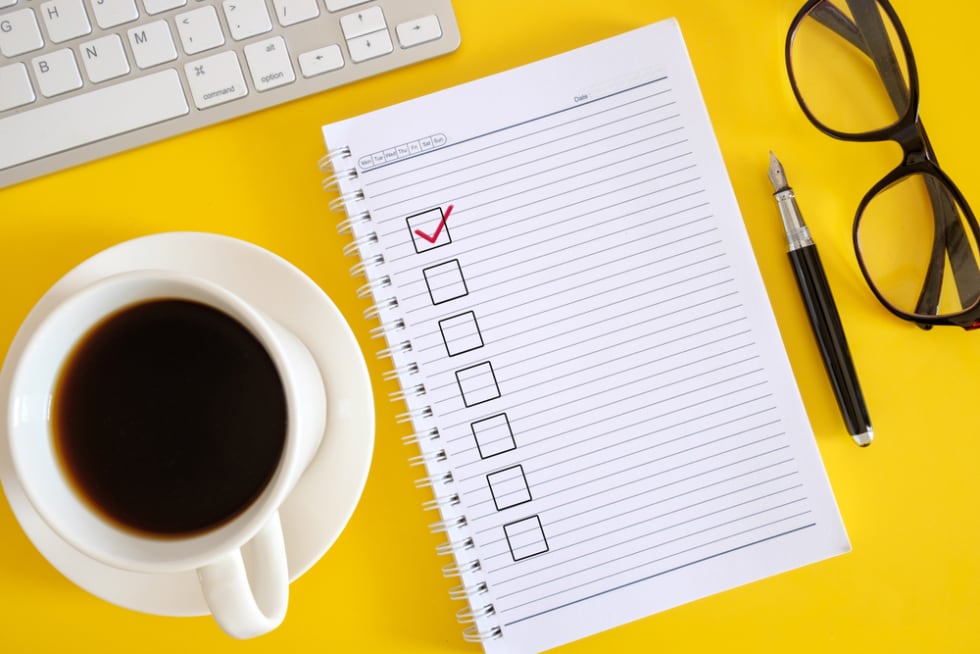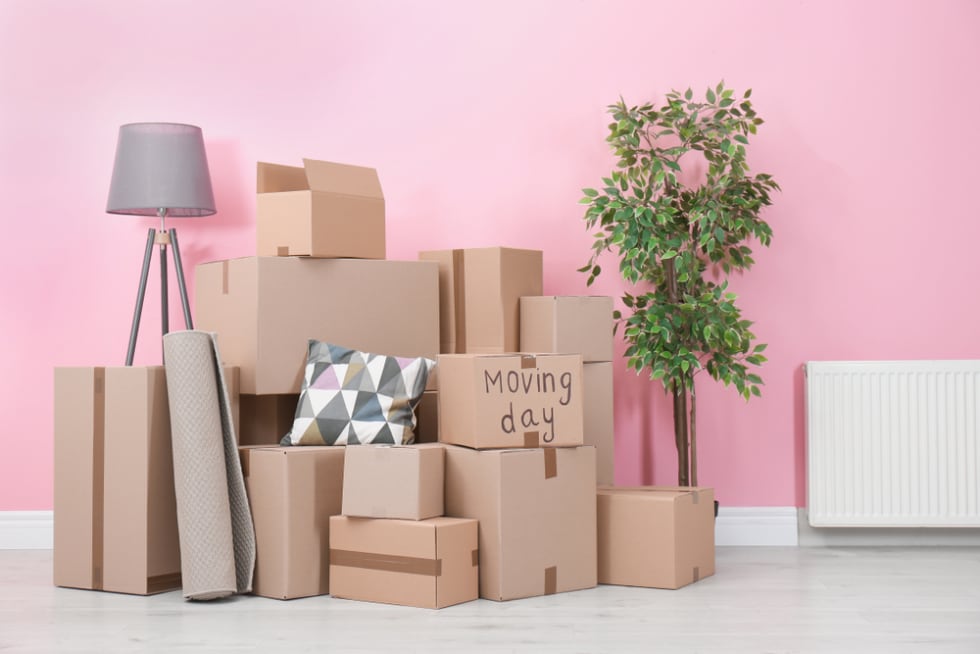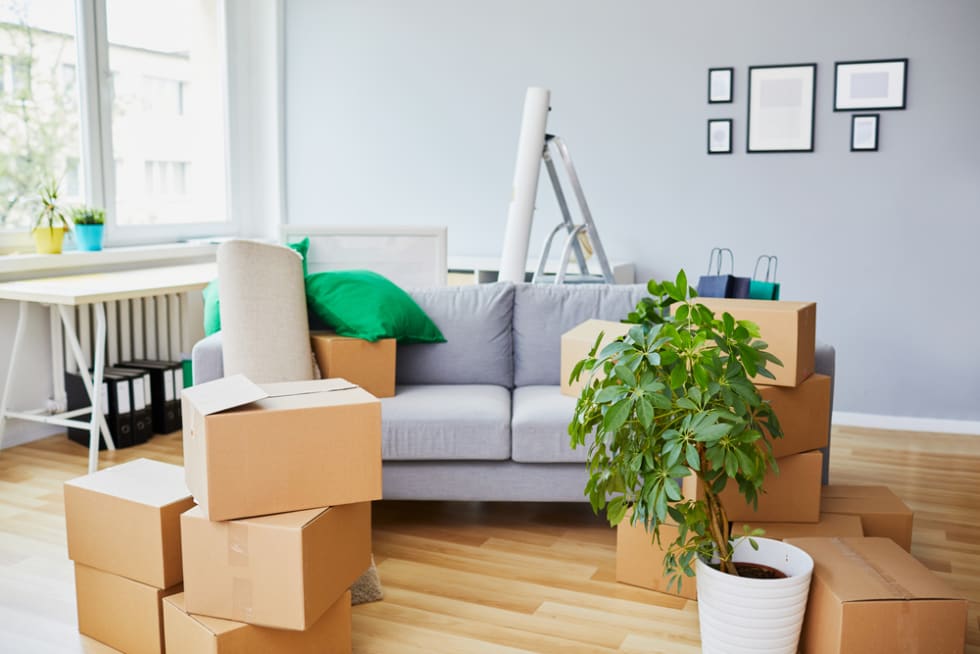South Bank at Quarry Trails
- 91 units available
- Studio • 1 bed • 2 bed • 3 bed
- Amenities
In unit laundry, Patio / balcony, Granite counters, Pet friendly, Stainless steel, Walk in closets + more

The best part of growing up is doing all the amazing things associated with adulting, including moving out. It can be an exhilarating experience. You're finally free from the rules of your parents and have a chance to make a space your own.
Whether you’re looking for a change of scenery, landed your dream job in a new city, or are making the move to college, it's important to understand that moving out for the first time comes with some challenges.
Unfortunately, many first time renters, especially those who weren't fully prepared for the move, can get overwhelmed by the sheer amount of planning and tasks it takes to complete a successful move-out.
That said — where should you start?. This guide will break down everything you need to know about moving out for the first time, whether you’re moving for a job, moving to college, or simply looking for a change in scenery. Let's dive in!
Money is the deciding factor in your move. If your bank account isn't prepared for all the costs associated with making a move, then you won't be able to do so.
Moving costs can be expensive, especially if you have a lot of belongings that you want to transport or if you are moving to a new state. Additionally, renting an apartment will typically require an in-depth review of your finances. Those aspects include your credit history and whether you have sufficient income to rent a unit.
The first thing you need to do when preparing to move out for the first time is to go through your finances with a fine-tooth comb. By doing so, you can determine whether your current financial situation will enable you to rent comfortably.
The best way to do this is to create a budget that accounts for the money you’ll need to make a move and go over your credit history. Here's how you can get started with creating your move-out budget.

The amount of money you'll need to move will depend entirely on your circumstances.
You’ll have to do some research during the budgeting phase. It starts with where you want to move.
While it's not possible to do a full account of all costs that you'll accumulate during your move, it's essential to try to get as close as possible. You don't want to deal with hidden costs that you simply cannot afford to pay.
That said, your research should start with initial moving costs or the costs associated with making the move to your new apartment. Here are some of the essential moving costs to consider in your move-out budget.
Review your current and expected income to come up with an accurate rent budget. If you’re moving to a new city for a new job, you can use your expected pre-tax income in our rent calculator to determine how much rent you can afford comfortably.
However, the golden rule about rent costs is that you should spend no more than 30% of your monthly pre-tax income on rent.
If you’re a college student and have taken out loans to cover living expenses, then you should consider your loan income and use the allotted amount to cover your rent.
Conversely, if your parents will be covering your living expenses (yay, mom and dad!), sit down with them to go over expected expenses. Find out how much they’re willing to cover.
Everyone's situation will be different. However, coming up with the rent amount that you can comfortably afford will ensure that you aren’t overwhelmed in the future.
This is especially important considering that you’ll have to cover the first month's rent and a security deposit. That usually amounts to two months' rent payment.
When considering these costs upfront, you should have 3x the amount of monthly rent saved to cover these costs. However, you should also consider:
Unless you’re able to commandeer a friend's truck or van, you'll likely be paying a moving company to transport your belongings to your new home. As moving companies undertake liability of your goods, they work hard to get them from place to place in one piece. That’s why hiring moving companies can be such a high-cost service.
Not to mention, sourcing boxes and other packing materials can be a pain and an issue for your wallet. You’ll have to research quotes from reputable movers in your area to get an estimate of how much it’ll cost to get your things from point A to B.
This number can be a wild card! Some apartment units will have hookups for a washing machine and dryer, but you’ll have to source one yourself.
Additionally, when you’re living alone for the first time, you begin to truly appreciate the value of having items like a cutting board and vacuum cleaner when you need them.
Unfortunately, furnishing a home can be expensive. Draw up a list of everything you’ll need, room by room.
You may be able to save by asking family members and friends if they have anything they’re looking to get rid of, like items that have been sitting in storage for a while.
Another often-overlooked amenity is a fully-stocked kitchen. You have not known culinary pain unless you’ve tried to make a meal for dinner only to realize that you are missing the key spice.
That said, your first grocery trip will be a major one. You’ll likely spend a few hundred gathering pantry essentials, cleaning materials, and pretty much everything you need to call a house a home.
Figuring out how much apartment utilities cost in a new area can be challenging. Not only do these costs vary greatly by area, but they can also vary based on your personal preferences.
For example, if you move to Arizona, then you’ll need to pay a small fortune in central cooling when those summer temperatures hit.
You can do some research by looking up online tools such as the EPA cost calculator or Numbeo to get an estimated cost expectation. However, these are estimates. You won’t get an accurate number until you’ve lived in your apartment for a month or two.
If you know what apartment complex you’re moving to, try asking the landlord or a current resident what a typical utility bill looks like.
Current expenses often get overlooked during the budgeting process. These are expenses that don't go away just because you've moved.
They include things like student loans, weekly takeout, gas, car insurance, and your phone bill. You're going to need to account for these expenses when creating a monthly budget for yourself. If you don't include these expenses, you may come up with a number that is much lower than what you will need to live comfortably every month.
Considering that this is your first move out, don’t let yourself be blindsided by one of the biggest factors that landlords consider when considering new tenants. Your credit score can help them to view you as a highly desirable tenant prospect. Or, it can cause landlords to question your habit of paying debts on time.
But what is the typical credit score needed to rent an apartment?
Generally, landlords look for a credit score of 650 or higher when renting their units. Regardless of which category you fall into, it’s crucial to know your credit score when renting an apartment.
Whether you have no credit or low credit, you have the power to increase your score and establish good credit. Here are a few quick tips to help you increase your credit score:

Now comes the fun part: planning! No seriously, though it doesn’t sound glamorous, planning can be fun. It allows you to start thinking about what you want in a dream apartment, including when you want to move, job prospects, and planning potential visits to your preferred neighborhoods.
Deciding when you want to move will depend on your circumstances. If you need to move in before college, then you have a set deadline.
However, if you want to wait to line up a job before planning a move, then you have a little leeway. That said, the apartment-hunting stage can take several weeks and meetings with landlords to complete. Keep that in mind when deciding when you want to start your hunt.
Back to finances for a bit. You’ll have to ensure that you’re in the right financial position to move.
If you need to save up, start as soon as possible. If you need to move sooner, rather than later, this can speed up your departure. That said, here are a few other factors to consider when creating your move-out timeline:
Try to create a move-out plan that is as detailed as possible, to ensure that you’re able to get the most out of your move when it’s time for you to go.

Assuming you aren't ready to buy a home at this age, you'll need to start apartment-hunting. This is where the real fun begins. You get to make a list of all your wants and needs, and hopefully, match it to an apartment that is well within your budget.
Speaking of your budget, sometimes you’ll have to amend it per the lease agreement. Some apartments may require additional fees for things like maintenance, they may have utility prices bundled into the rent, or they may have free WiFi. So, don’t create a budget that’s set in stone until you’ve started to look for apartments.
If you’re renting in a city that’s notorious for its high cost of living, you may be more inclined to make money-saving maneuvers to maximize your budget. You may consider renting with roommates. That can cause your rent responsibility to go down by over 50%.
Once you’ve gotten the essential details down, including answering the big “will you or won’t you” regarding roommates, you can start applying. Just be sure to have your apartment application materials ready to go beforehand. At minimum, you should have a completed application, landlord or professional references, and relevant financial information.
If all goes well, you’ll be ready to make your move!

Have we mentioned preparation too much? Sorry, but it’s the most effective way to get the most out of your first move out, especially at this stage.
After all your hard work and preparation, everything is set into motion and you’re about to plant roots in a home of your own. That’s why it’s crucial to be prepared and organized.
Here are the essentials you need to have covered before making your move to a new place.
This list only features the bare minimum. If you want a more comprehensive guide to what you’ll need to have a fully furnished first apartment, check out our first apartment checklist.

Now’s the time to recreate that famous The Fresh Prince of Bel-Air finale scene. Well... maybe it won’t be as dramatic, but as you’ll be packing up most of your belongings and living on your own for the first time, it’s still pretty monumental.
When it comes to getting everything packed up, it’s important to make sure everything is packed securely. Whether you’re using a moving company or working with your friends to get your belongings to their final destination, ensuring that they’re packed well can help you avoid the dreaded experience of opening a box of crushed glasses and beaten-up plants.
Don’t try to pack everything alone. Enlist the help of your friends and family. Not only will it be much more efficient, but you can also treat the meet up to pack up all your stuff as a going-away party! Simply provide food and drink, and you’ll have a party going while you get your stuff packed away for your move.
However, it’s important to be aware that not every move is a DIY task. Sometimes, it’s best to enlist the help of a moving company, especially if you’re moving a large number of items. Be sure to check the reputation of the company ahead of time. Ask friends and family for recommendations to avoid a lengthy blind search.

Ideally, you should take care of setting up your new home before you move in. This will help you avoid sitting in an apartment with no heat, WiFi, or electricity (essentially, a cave).
That’s why you’ll need to work on changing your address at least two weeks before your move. Check out this change of address checklist for all the essential address changes you’ll need to make prior to moving into your new place.
Beyond address changes, you’ll just need to make sure you have everything you need to feel comfortable living in your new home. The most crucial elements to attend to are furniture, cooking supplies, and cleaning materials. Stock your kitchen with essentials by building a new apartment grocery list and heading out on a grocery store shopping spree.
Once you’ve got everything you need, it’s time to focus on making your new place yours. Veg out in your apartment for a weekend.
Become accustomed to the comfort of your new furniture. Determine how well your new oven handles cookies, and of course, sleep in on Sunday morning to enjoy the warmth of your bed.
Once you get comfortable with your apartment, you’ll need to get comfortable with the neighborhood and make some new friends. Schedule an entire day out on the town, talk to strangers, eat at new restaurants, and enjoy the rewards of your efforts.
When it comes to moving out for the first time, preparation is key. It’s crucial to ensure that you’ve hammered out all the essential details before moving forward with your plans to move.
That said, not every part of your apartment search has to be hard. Simply take our quiz above to find the apartment of your dreams. Get started today!

In unit laundry, Patio / balcony, Granite counters, Pet friendly, Stainless steel, Walk in closets + more
In unit laundry, Hardwood floors, Dishwasher, 24hr maintenance, Stainless steel, Walk in closets + more